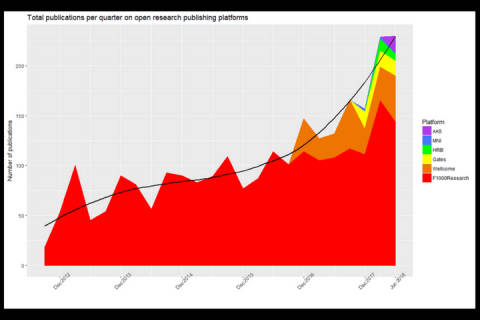Scientists have discovered the world’s oldest colour and it might not be what you think, as it’s bright pink! The bright pink pigments are molecular fossils of chlorophyll produced by tiny ancient cyanobacteria. Given this finding on cyanobacteria and evolution we share the top three articles related to the evolution of marine microbes; our usual top three articles for the month; and our Hidden Jewels.
A method article published on NC3Rs gateway on F1000Research describes the process of making whole brain organotypic slices and explains how this method can be used to reduce and refine the use of animals in Alzheimer’s disease research. In this Q&A, authors Cara Croft and Wendy Noble (CC and WN), and reviewer Claire Durrant (CD), talk about the 3Rs (replacing, reducing and refining); the NC3Rs gateway and their experience of open peer review.
In the UK, migrants and ethnic minorities have higher rates of tuberculosis (TB) compared with the general population. Much of the focus has been on pathogen exposure to explain the disparity. However, in their review published in F1000Research, Sally Hayward and Rachel Tanner explain that there are multiple factors at play. Here they discuss how these factors could contribute to the different rates of TB between groups and populations.
July’s faculty member of the month is Nobel laureate Joachim Frank. In this Q&A, we go back to October 2017 to talk about the day the Nobel prize winners were announced. Among the celebrating and the press engagements, Joachim still found the time to write a Prime recommendation for an article about the very technique for which he was awarded.
Europe PMC repository will start indexing preprints. In this blog post Rebecca Lawrence, Managing Director at F1000, talks about the growth of preprinting and the value this initiative has for research.
Hollydawn Murray announces the new Cytoscape Automation collection and we hear from users about its value for sharing and reproducibility.
Weekend lie-ins could be beneficial for our health, according to a study published in the Journal of Sleep Research. Not getting enough sleep could increase our risk of death, but lie-ins could counter the effect of short sleeps during the week, and this ‘catch up’ sleep could reduce the risk of early mortality. Considering this, we share our top three articles on sleep and circadian rhythms, and our usual top three articles for the month and our Hidden Jewels. Click on the images for full access to the recommendations.
Christian Ohmann discusses his research article on sharing individual participant data from clinical trials explaining the current challenges in sharing this data and what can be done to overcome these challenges. Sharing sensitive data Sharing detailed result data, as part of ‘open science’, is the norm in many scientific disciplines, but this has only recently…
The decrease in cost and increase in scale of biological data production and its diverse applications has changed life science research in recent years. Applied bioinformatics skills are now essential to successfully analyse data from high-throughput ‘omics instrumentation in many fields of biology. This has resulted in a need to upskill the life science workforce,…
Our June Faculty Member of the Month is Maria-José Molina Garrido, a Medical Oncologist and Head of Cancer in the Elderly Consultation at the Hospital General Virgen de la Luz in Cuenca, Spain. In this Q&A, she tells us more about her speciality in Geriatric Oncology, focusing on geriatric assessment and frailty in elderly cancer patients.













